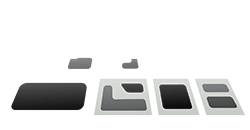Awardee: jacob c hammes
Primary Artistic Medium: Media Arts
Idea
During the summer of 2020 we saw cities all over the country come out of quarantine to participate in the largest protest movement in recent history. Yet, these loud and vocal calls to end police brutality were disturbingly met with more police violence to squash dissent. Protestors were beaten, pepper sprayed, tear gassed, and shot with rubber bullets in response to calls for greater police accountability.
As a participant in many of the recent marches and occupations, I have seen first hand how shockingly eager to harm the police can be. I have seen people have their bodies hit with sticks and fall unconscious. These protests have polarized communities, often along lines of race, class, and politics. But no matter how many journalists report on the disgusting abuse of power and improper use of force we’ve seen, there are those who choose to believe that the media itself is biased and that the protestors are the real source of violence.
My project is to create an audio work (or series) from recordings of people beaten by police at the recent political demonstrations in Philadelphia, including Black Lives Matter, Camp JTD, Occupy PHA, and Occupy ICE. Because I will be interviewing people, this shares a sort of journalistic methodology, however, my goal is to interview victims to create a situation where the common ground is located in our own bodily response to pain, trauma, anxiety. Descriptions of the mental, emotional, and physical toll taken and the struggle through recovery is the goal.
Having a background in radio, experimental music, and performance art, I hope to bring strategies from these disciplines to this work. The first (and most important) step is to locate these people and interview them. These will be original recordings conducted as interviews with activists, embedded into something of a collage with music, field recordings, and other sonic material taken around these protests. I do not yet know the specific form this will take, but it could be realized as a work for radio, as a podcast, as a public broadcast on outdoor speakers, or a hybrid of these.
Journalism tends to attempt factual, unbiased reporting on these events. But in this political climate, understanding the facts isn’t enough, we (as artists) have to create encounters with the harsh brutality and bodily harm that is at stake. I believe that what may be lacking from these reports is a focus on the viscerally descriptive, emotionally provocative, empathy generating work that art can do. I believe that hearing the voices of people describing these experiences can help do this work. I believe that people who have experienced these things have something to teach us, regardless of any specific political agenda, and that the value of dissent in the face of authoritarian power does not fall on exclusive party lines. I hope to create something that can powerfully speak to our shared humanity.



